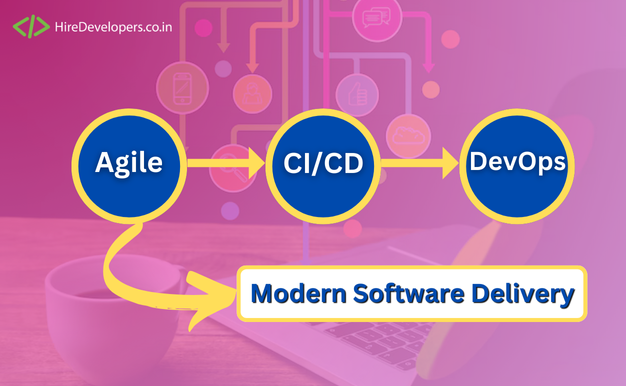December 1, 2024
Author: admin
Agile, CI/CD, and DevOps: A Comprehensive Guide to Modern Software Delivery

The need for faster and more efficient delivery methods has never been greater in the world of software development. Agile, DevOps, and CI/CD pipelines have become essential practices for achieving these goals. In this guide, we’ll break down the key concepts behind Agile, CI/CD, and DevOps to help you understand how they work together and why they are so important for modern software delivery. And if you’re serious about improving your software delivery, don’t hesitate to hire DevOps engineers who can bring the right skills and expertise to your team.
What is Agile Methodology?
Agile is a way of working that emphasizes flexibility, collaboration, and fast feedback. It breaks large projects into smaller, manageable pieces that can be developed, tested, and released quickly. This allows teams to adapt to changing requirements and deliver valuable features to users more frequently.
The Agile transformation process helps organizations shift from traditional, slow methods of development to more flexible and responsive ones. By embracing Agile, teams can focus on delivering continuous value to customers while reducing the risk of long development cycles and large project failures
What is Agile Software Development?
Agile is a flexible approach to software development that focuses on delivering small, functional pieces of software in quick iterations. Instead of offering a strict set of rules, Agile encourages collaboration and adaptability. It’s about how teams work together and how they choose to approach tasks.
By embracing Agile methodologies, teams deliver working software more quickly, respond to customer feedback, and make continuous improvements. Agile teams typically consist of small, self-organizing groups of developers and business stakeholders. They regularly meet to discuss progress and adapt their approach based on the project’s needs.
Complete information for usage is covered by the blog
- Top 10 Most Popular Technologies
- Business Requirements Document
- Difference Between Google Ads and Meta Ads
- What is PPC
What Are the Core Values of Agile Development?
The Agile Manifesto emphasizes four core values:
- Deliver working software instead of excessive documentation.
- Collaborate with customers rather than getting bogged down in contracts.
- Embrace change instead of rigidly sticking to a plan.
The 12 Principles of Agile
The Agile Manifesto also defines 12 principles, including:
- Ensure customer satisfaction by delivering value early and consistently.
- Break large tasks into small, manageable ones.
- Allow self-organizing teams to produce the best results.
- Provide team members with the support and environment they need to succeed.
- Create processes that ensure sustainable efforts over time.
- Maintain a steady pace of delivering completed work.
- Welcome changes to requirements, even late in the project.
- Hold daily meetings with project teams and business owners.
- Continually improve efficiency by adjusting development practices.
- Measure progress by the amount of valuable, completed work.
- Strive for excellence in all stages.
Understanding DevOps
DevOps is a cultural and technical approach to software development that brings together developers and operations teams to work collaboratively. The goal of DevOps culture is to shorten the software development lifecycle by automating processes and improving communication between teams.
In a DevOps environment, developers and operations work hand-in-hand to ensure that code is written, tested, and deployed efficiently. This approach fosters faster releases, higher quality, and more reliable software.
By adopting DevOps, teams can break down silos between departments and create a seamless flow from development to production, allowing them to respond to customer needs more quickly.
CI/CD: The Backbone of DevOps
One of the key components of a successful DevOps strategy is Continuous Integration (CI) and Continuous Delivery (CD). CI is the practice of automatically testing and integrating code changes into the main branch of a project, ensuring that new features or fixes don’t break the existing system. CD takes this a step further by automating the deployment process, so new code can be safely released to users with minimal human intervention.
Together, CI and CD help teams maintain a high level of quality while delivering software more frequently. This means fewer bugs, faster updates, and a smoother experience for end-users.
To make the most of DevOps, teams need to choose the right DevOps tools that support automation, collaboration, and monitoring. These tools help streamline the development process and ensure that all changes are deployed efficiently and securely.
How Agile and DevOps Relate to CI/CD and Working Together?
The principles of Agile directly influenced the rise of DevOps and the adoption of CI/CD. While Agile focuses on the work of development teams, DevOps expands this scope to include downstream activities like deployment and release management.
At the heart of DevOps is the desire to break down silos between teams, promoting collaboration to deliver valuable software continuously. This is achieved through practices like continuous integration, continuous delivery, and continuous deployment, which aim to speed up software delivery without sacrificing quality.
How CI/CD Promotes Iterative Development?
The CI/CD pipeline is designed to automate as many steps as possible in the software development process. By providing rapid feedback and breaking projects into smaller parts, the pipeline helps teams release updates to users faster. Developers are encouraged to commit code frequently, knowing that automated tests will quickly check for errors and provide feedback.
If code meets the required quality standards, it automatically moves through the pipeline, eventually being deployed to production.
CI/CD Enhances Collaboration
One of the key values of Agile is collaboration, and this is further emphasized in DevOps. By using CI/CD, teams gain access to dashboards and notifications that provide visibility into every build and change made. This transparency helps developers, operations teams, and stakeholders stay informed about progress.
CI/CD Improves Software Quality
Quality is central to the CI/CD pipeline. Automated testing on every commit ensures that software is functioning correctly and builds confidence in the quality of each release. Quick feedback loops make it possible to spot issues early, fix them, and deploy updates faster.
Fast feedback is key to maintaining quality. By automating testing and deployment, teams can gather real-time feedback from users and use it to improve software continuously.
Why Should You Hire a DevOps Engineer?
For businesses looking to improve their software delivery process, it’s essential to hire DevOps engineers. These professionals are responsible for implementing and maintaining DevOps practices within a company, ensuring that teams work together smoothly and that software is released quickly and efficiently.
A skilled DevOps engineer will have a deep understanding of both development and operations, as well as experience with DevOps tools like Jenkins, Docker, Kubernetes, and others. By bringing a DevOps engineer onto your team, you can take full advantage of the benefits that Agile, CI/CD, and DevOps have to offer, including faster delivery times, higher quality products, and improved customer satisfaction.
Conclusion
Agile, CI/CD, and DevOps are more than just buzzwords; they represent a fundamental shift in how software is developed and delivered. By adopting these practices, organizations can improve efficiency, reduce risk, and deliver better products to their customers. If you’re looking to implement these modern development practices, it’s time to consider an Agile transformation and embrace the DevOps culture.








